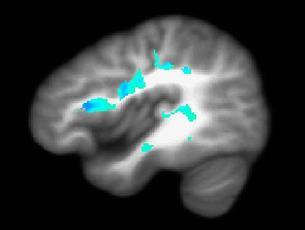Published: March 31, 2009
Is the turmoil we see in our teens something that our culture has created? The excellent All in the Mind, presented by Natasha Mitchell,covers what happens to teenagers as their brain develops.
Monosyllabic, messy, self-conscious and sleepy – science now has the tumultuous teenager in its sights. Are they risk-takers with brains still under construction? Or competent adults grossly misinterpreted by modern science? From evolutionary theories to the bright lights of the brain scan – a provocative debate is being waged.
 Link to listen to this podcast
Link to listen to this podcast
Source: All in the mind
We’d love to hear what you think? Do you agree – is teenage turmoil something that we have created as a culture? Or do you think biology is the main influence on teenagers behaviour?
Published: February 3, 2009

Yellow areas in the brain of a heavy marijuana user show brain regions with the most significant abnormalities. These areas correspond with those under development during normal adolescent years.
Adolescents and young adults who are heavy users of marijuana are more likely than non-users to have disrupted brain development, according to a new study. Pediatric researchers found abnormalities in areas of the brain that interconnect brain regions involved in memory, attention, decision-making, language and executive functioning skills. The findings are of particular concern because adolescence is a crucial period for brain development and maturation. [continue reading…]
Published: October 6, 2008

© iStockphoto
Mental agility does not have to decline with age, as long as you keep exercising your mind, says Anna van Praagh . Telegraph
For the next 10 weeks,the telegraph will be publishing puzzles from the new book Puzzler Brain Trainer, from  neuropsychologist Ian Robertson, professor of psychology at Trinity College, Dublin and founding director of the university’s Institute of Neuroscience. He devised the  90-Day Workout to stretch, sharpen and stimulate the brain.
Professor Robertson’s tips for mental stimulation :
• Stimulate your brain regularly with puzzles.
• Keep physically fit. Exercise causes the brain to produce a kind of fertiliser called brain-derived neurotrophic factor that helps build new brain connections.
• Keep up your social life. Mixing with others is of immense value in keeping the brain active and alive.
• Learn new things: young people have to learn all the time which is why their brains are sharper. Keep it up, and generate new brain cells.
• Try to avoid prolonged and severe stress — it can affect neuro-transmitters in the brain and may impair its function.
• Eat food that is good for your heart and brain — plenty of fruit, vegetables and fish. Reduce saturated fat.
• Think young; people who perceive themselves as old are more likely to display signs of being old.
 Link to read more
Sex is good for a lot of things. One of the most important is the way in which sex leads to a shuffling of the genetic cards in every individual. Scientists in Cardiff are beginning to build up a picture of what certain genes are doing in the brain and how they affect behaviour. The results, delegates were told in Geneva today (Sunday 13 July), could help researchers find the causes for conditions such as autism. [continue reading…]
![]() Link to listen to this podcast
Link to listen to this podcast


